BMA735 - Management Ethics: Frameworks, Responsibilities, Decisions
VerifiedAdded on 2022/11/15
|9
|2702
|1
Essay
AI Summary
This essay provides a comprehensive overview of management ethics, exploring various ethical frameworks, responsibilities, and decision-making processes within organizations. It discusses immoral, moral, and amoral management styles, highlighting the importance of ethical leadership, integrity, and social responsiveness. The essay examines different approaches to ethical decision-making, including utilitarianism, moral rights, and social justice, emphasizing the need for fairness, transparency, and accountability. It also underscores the role of business ethics in serving customer needs and ensuring the long-term survival of firms, advocating for ethical practices in all aspects of organizational operations. Desklib offers a platform for students to access this essay and many other solved assignments to aid in their studies.
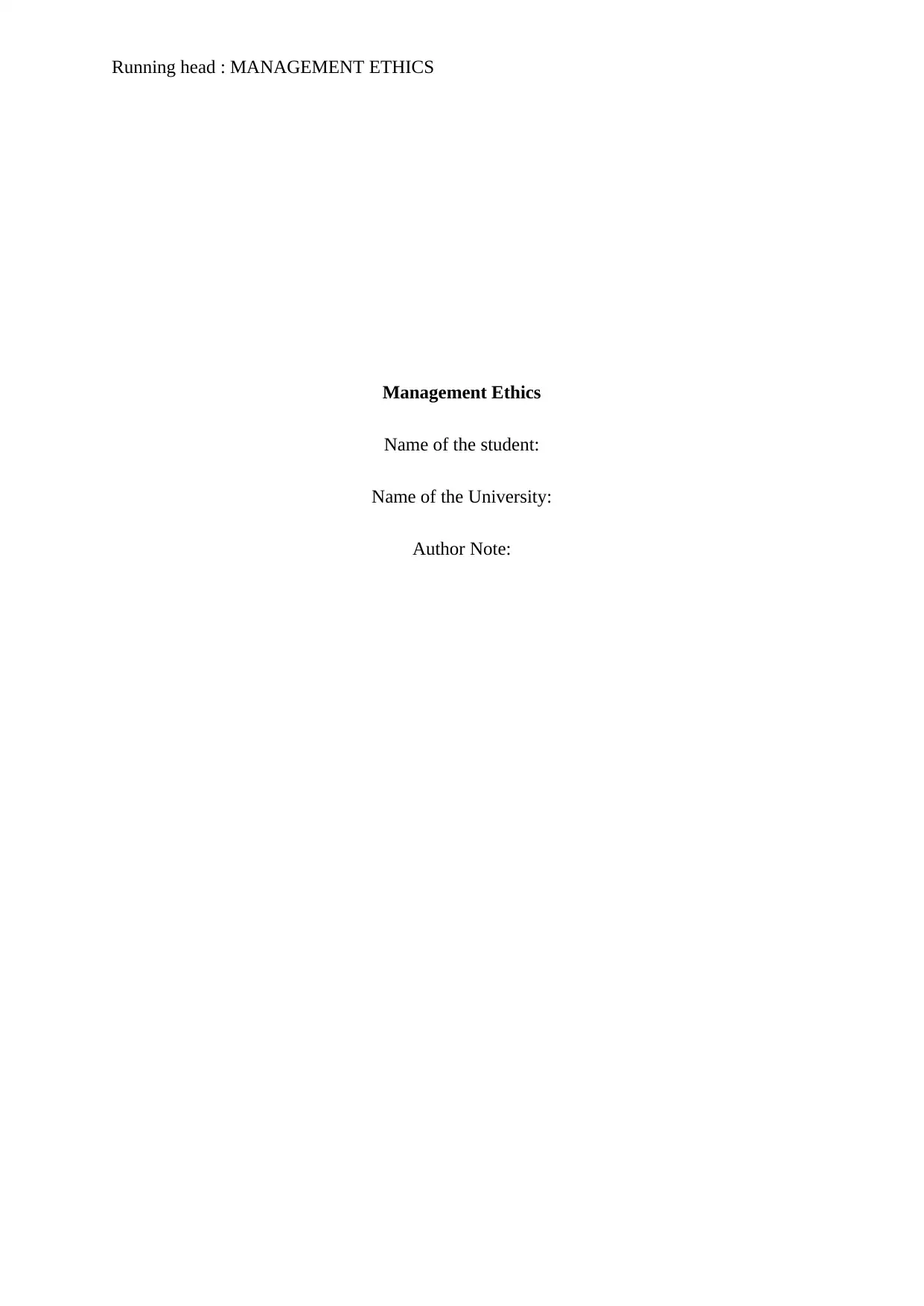
Running head : MANAGEMENT ETHICS
Management Ethics
Name of the student:
Name of the University:
Author Note:
Management Ethics
Name of the student:
Name of the University:
Author Note:
Paraphrase This Document
Need a fresh take? Get an instant paraphrase of this document with our AI Paraphraser
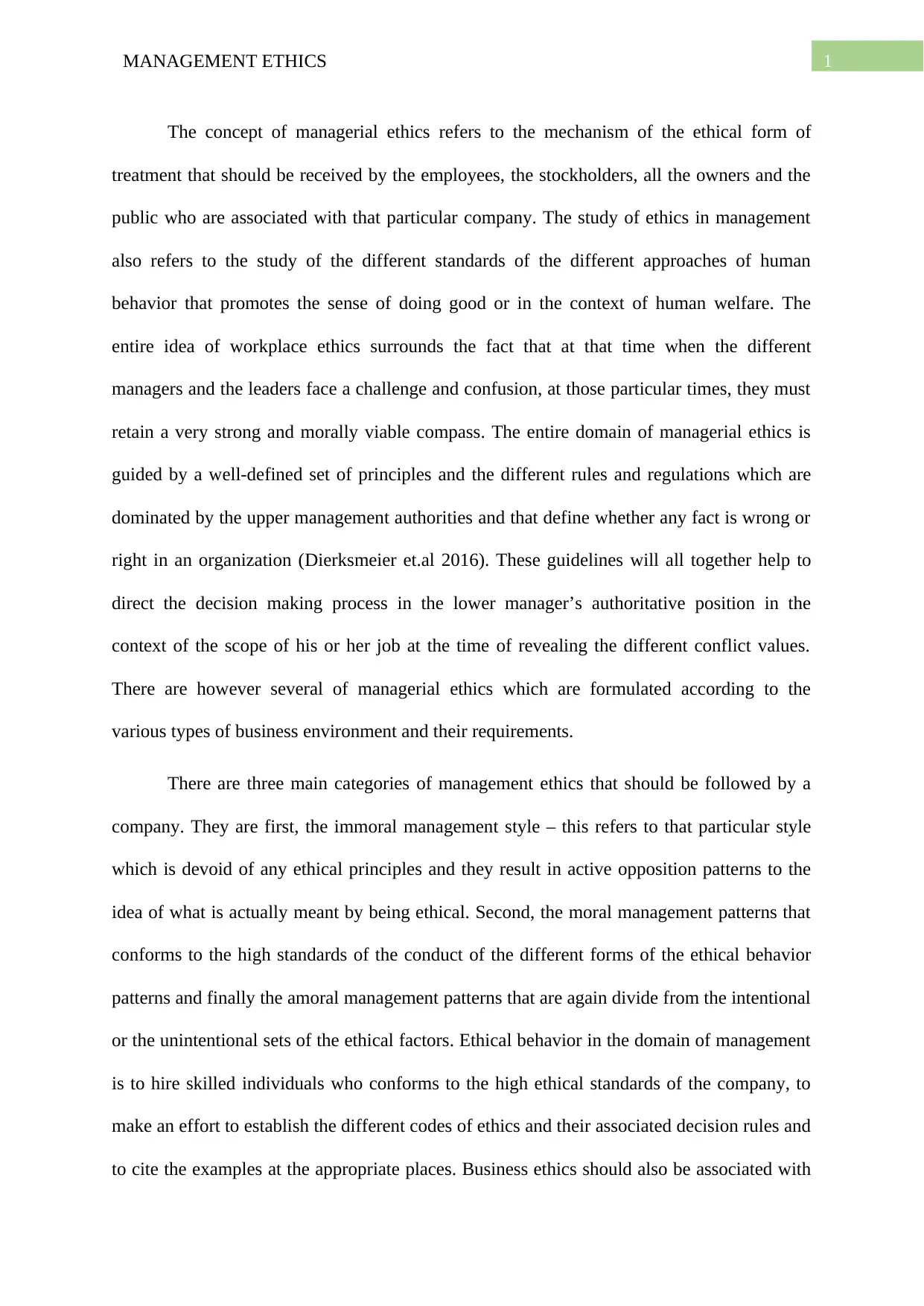
1MANAGEMENT ETHICS
The concept of managerial ethics refers to the mechanism of the ethical form of
treatment that should be received by the employees, the stockholders, all the owners and the
public who are associated with that particular company. The study of ethics in management
also refers to the study of the different standards of the different approaches of human
behavior that promotes the sense of doing good or in the context of human welfare. The
entire idea of workplace ethics surrounds the fact that at that time when the different
managers and the leaders face a challenge and confusion, at those particular times, they must
retain a very strong and morally viable compass. The entire domain of managerial ethics is
guided by a well-defined set of principles and the different rules and regulations which are
dominated by the upper management authorities and that define whether any fact is wrong or
right in an organization (Dierksmeier et.al 2016). These guidelines will all together help to
direct the decision making process in the lower manager’s authoritative position in the
context of the scope of his or her job at the time of revealing the different conflict values.
There are however several of managerial ethics which are formulated according to the
various types of business environment and their requirements.
There are three main categories of management ethics that should be followed by a
company. They are first, the immoral management style – this refers to that particular style
which is devoid of any ethical principles and they result in active opposition patterns to the
idea of what is actually meant by being ethical. Second, the moral management patterns that
conforms to the high standards of the conduct of the different forms of the ethical behavior
patterns and finally the amoral management patterns that are again divide from the intentional
or the unintentional sets of the ethical factors. Ethical behavior in the domain of management
is to hire skilled individuals who conforms to the high ethical standards of the company, to
make an effort to establish the different codes of ethics and their associated decision rules and
to cite the examples at the appropriate places. Business ethics should also be associated with
The concept of managerial ethics refers to the mechanism of the ethical form of
treatment that should be received by the employees, the stockholders, all the owners and the
public who are associated with that particular company. The study of ethics in management
also refers to the study of the different standards of the different approaches of human
behavior that promotes the sense of doing good or in the context of human welfare. The
entire idea of workplace ethics surrounds the fact that at that time when the different
managers and the leaders face a challenge and confusion, at those particular times, they must
retain a very strong and morally viable compass. The entire domain of managerial ethics is
guided by a well-defined set of principles and the different rules and regulations which are
dominated by the upper management authorities and that define whether any fact is wrong or
right in an organization (Dierksmeier et.al 2016). These guidelines will all together help to
direct the decision making process in the lower manager’s authoritative position in the
context of the scope of his or her job at the time of revealing the different conflict values.
There are however several of managerial ethics which are formulated according to the
various types of business environment and their requirements.
There are three main categories of management ethics that should be followed by a
company. They are first, the immoral management style – this refers to that particular style
which is devoid of any ethical principles and they result in active opposition patterns to the
idea of what is actually meant by being ethical. Second, the moral management patterns that
conforms to the high standards of the conduct of the different forms of the ethical behavior
patterns and finally the amoral management patterns that are again divide from the intentional
or the unintentional sets of the ethical factors. Ethical behavior in the domain of management
is to hire skilled individuals who conforms to the high ethical standards of the company, to
make an effort to establish the different codes of ethics and their associated decision rules and
to cite the examples at the appropriate places. Business ethics should also be associated with
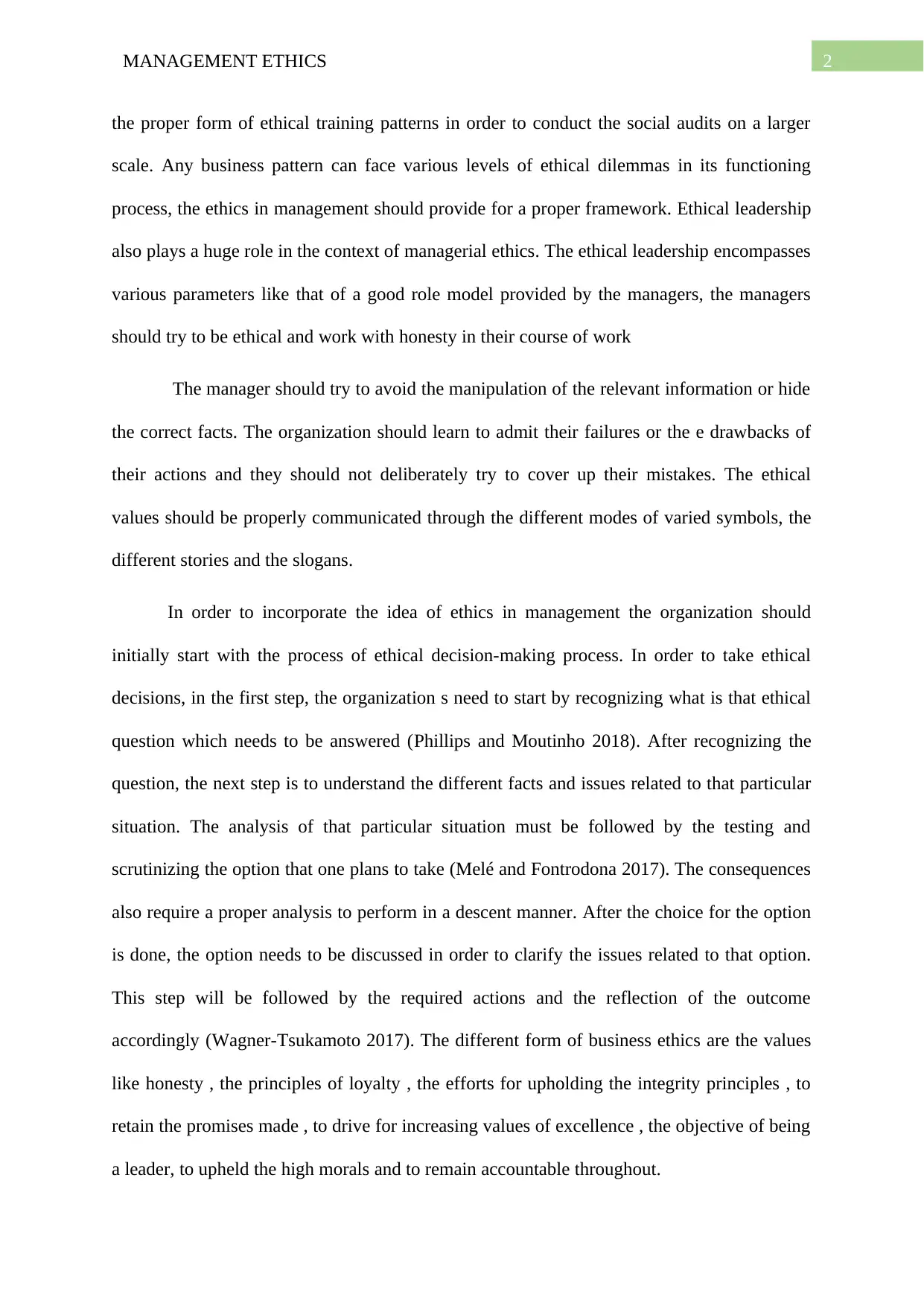
2MANAGEMENT ETHICS
the proper form of ethical training patterns in order to conduct the social audits on a larger
scale. Any business pattern can face various levels of ethical dilemmas in its functioning
process, the ethics in management should provide for a proper framework. Ethical leadership
also plays a huge role in the context of managerial ethics. The ethical leadership encompasses
various parameters like that of a good role model provided by the managers, the managers
should try to be ethical and work with honesty in their course of work
The manager should try to avoid the manipulation of the relevant information or hide
the correct facts. The organization should learn to admit their failures or the e drawbacks of
their actions and they should not deliberately try to cover up their mistakes. The ethical
values should be properly communicated through the different modes of varied symbols, the
different stories and the slogans.
In order to incorporate the idea of ethics in management the organization should
initially start with the process of ethical decision-making process. In order to take ethical
decisions, in the first step, the organization s need to start by recognizing what is that ethical
question which needs to be answered (Phillips and Moutinho 2018). After recognizing the
question, the next step is to understand the different facts and issues related to that particular
situation. The analysis of that particular situation must be followed by the testing and
scrutinizing the option that one plans to take (Melé and Fontrodona 2017). The consequences
also require a proper analysis to perform in a descent manner. After the choice for the option
is done, the option needs to be discussed in order to clarify the issues related to that option.
This step will be followed by the required actions and the reflection of the outcome
accordingly (Wagner-Tsukamoto 2017). The different form of business ethics are the values
like honesty , the principles of loyalty , the efforts for upholding the integrity principles , to
retain the promises made , to drive for increasing values of excellence , the objective of being
a leader, to upheld the high morals and to remain accountable throughout.
the proper form of ethical training patterns in order to conduct the social audits on a larger
scale. Any business pattern can face various levels of ethical dilemmas in its functioning
process, the ethics in management should provide for a proper framework. Ethical leadership
also plays a huge role in the context of managerial ethics. The ethical leadership encompasses
various parameters like that of a good role model provided by the managers, the managers
should try to be ethical and work with honesty in their course of work
The manager should try to avoid the manipulation of the relevant information or hide
the correct facts. The organization should learn to admit their failures or the e drawbacks of
their actions and they should not deliberately try to cover up their mistakes. The ethical
values should be properly communicated through the different modes of varied symbols, the
different stories and the slogans.
In order to incorporate the idea of ethics in management the organization should
initially start with the process of ethical decision-making process. In order to take ethical
decisions, in the first step, the organization s need to start by recognizing what is that ethical
question which needs to be answered (Phillips and Moutinho 2018). After recognizing the
question, the next step is to understand the different facts and issues related to that particular
situation. The analysis of that particular situation must be followed by the testing and
scrutinizing the option that one plans to take (Melé and Fontrodona 2017). The consequences
also require a proper analysis to perform in a descent manner. After the choice for the option
is done, the option needs to be discussed in order to clarify the issues related to that option.
This step will be followed by the required actions and the reflection of the outcome
accordingly (Wagner-Tsukamoto 2017). The different form of business ethics are the values
like honesty , the principles of loyalty , the efforts for upholding the integrity principles , to
retain the promises made , to drive for increasing values of excellence , the objective of being
a leader, to upheld the high morals and to remain accountable throughout.
⊘ This is a preview!⊘
Do you want full access?
Subscribe today to unlock all pages.

Trusted by 1+ million students worldwide
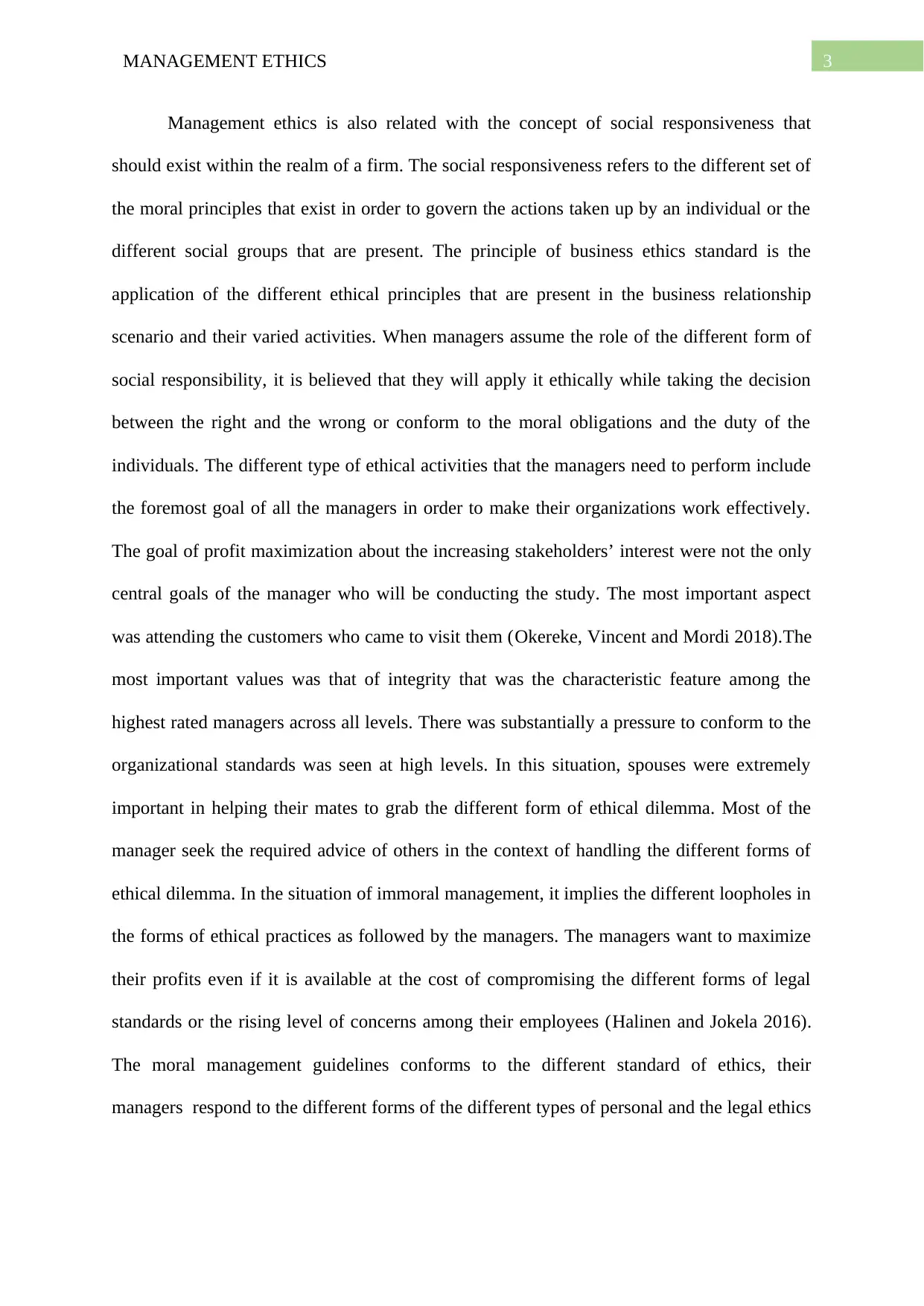
3MANAGEMENT ETHICS
Management ethics is also related with the concept of social responsiveness that
should exist within the realm of a firm. The social responsiveness refers to the different set of
the moral principles that exist in order to govern the actions taken up by an individual or the
different social groups that are present. The principle of business ethics standard is the
application of the different ethical principles that are present in the business relationship
scenario and their varied activities. When managers assume the role of the different form of
social responsibility, it is believed that they will apply it ethically while taking the decision
between the right and the wrong or conform to the moral obligations and the duty of the
individuals. The different type of ethical activities that the managers need to perform include
the foremost goal of all the managers in order to make their organizations work effectively.
The goal of profit maximization about the increasing stakeholders’ interest were not the only
central goals of the manager who will be conducting the study. The most important aspect
was attending the customers who came to visit them (Okereke, Vincent and Mordi 2018).The
most important values was that of integrity that was the characteristic feature among the
highest rated managers across all levels. There was substantially a pressure to conform to the
organizational standards was seen at high levels. In this situation, spouses were extremely
important in helping their mates to grab the different form of ethical dilemma. Most of the
manager seek the required advice of others in the context of handling the different forms of
ethical dilemma. In the situation of immoral management, it implies the different loopholes in
the forms of ethical practices as followed by the managers. The managers want to maximize
their profits even if it is available at the cost of compromising the different forms of legal
standards or the rising level of concerns among their employees (Halinen and Jokela 2016).
The moral management guidelines conforms to the different standard of ethics, their
managers respond to the different forms of the different types of personal and the legal ethics
Management ethics is also related with the concept of social responsiveness that
should exist within the realm of a firm. The social responsiveness refers to the different set of
the moral principles that exist in order to govern the actions taken up by an individual or the
different social groups that are present. The principle of business ethics standard is the
application of the different ethical principles that are present in the business relationship
scenario and their varied activities. When managers assume the role of the different form of
social responsibility, it is believed that they will apply it ethically while taking the decision
between the right and the wrong or conform to the moral obligations and the duty of the
individuals. The different type of ethical activities that the managers need to perform include
the foremost goal of all the managers in order to make their organizations work effectively.
The goal of profit maximization about the increasing stakeholders’ interest were not the only
central goals of the manager who will be conducting the study. The most important aspect
was attending the customers who came to visit them (Okereke, Vincent and Mordi 2018).The
most important values was that of integrity that was the characteristic feature among the
highest rated managers across all levels. There was substantially a pressure to conform to the
organizational standards was seen at high levels. In this situation, spouses were extremely
important in helping their mates to grab the different form of ethical dilemma. Most of the
manager seek the required advice of others in the context of handling the different forms of
ethical dilemma. In the situation of immoral management, it implies the different loopholes in
the forms of ethical practices as followed by the managers. The managers want to maximize
their profits even if it is available at the cost of compromising the different forms of legal
standards or the rising level of concerns among their employees (Halinen and Jokela 2016).
The moral management guidelines conforms to the different standard of ethics, their
managers respond to the different forms of the different types of personal and the legal ethics
Paraphrase This Document
Need a fresh take? Get an instant paraphrase of this document with our AI Paraphraser
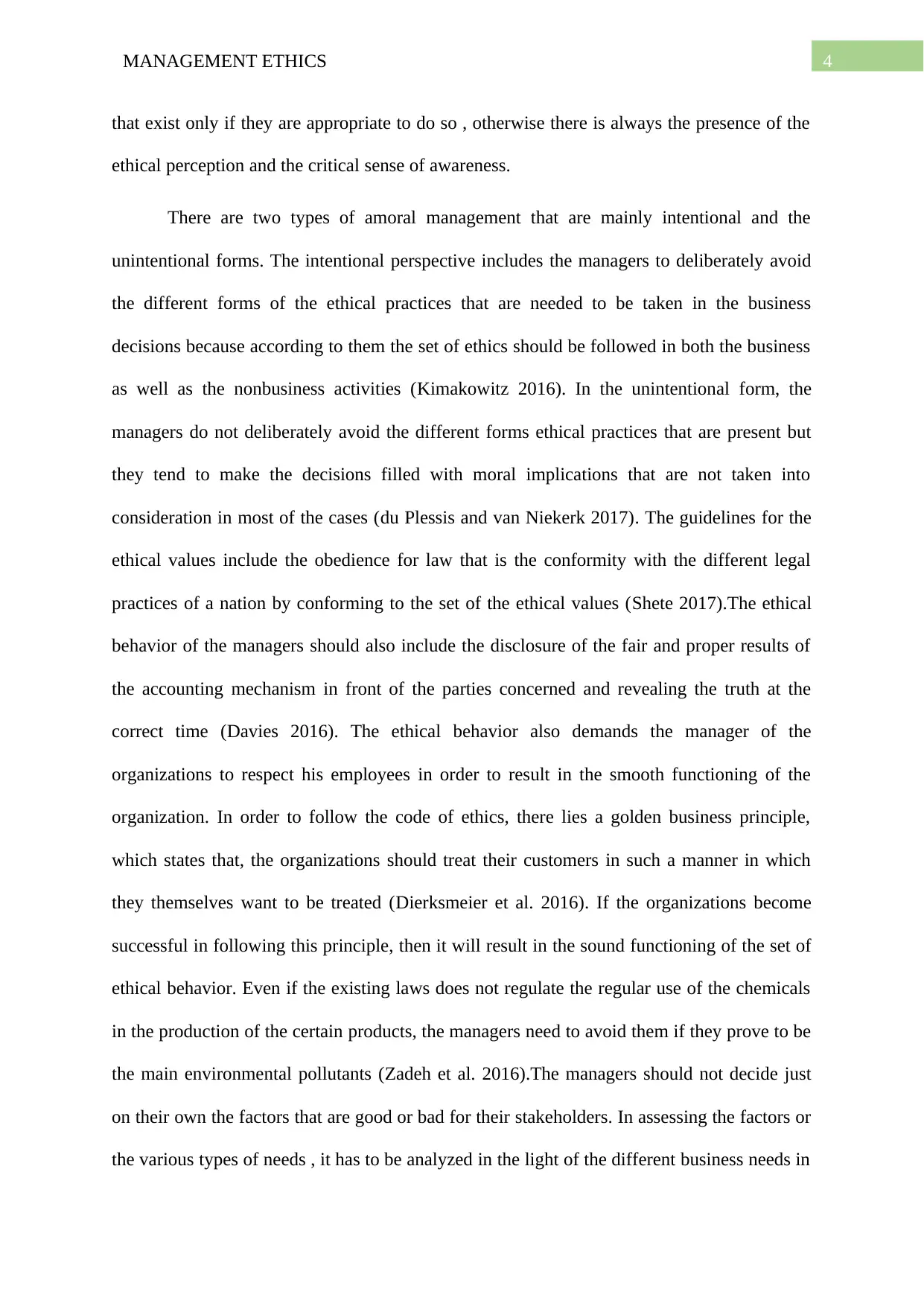
4MANAGEMENT ETHICS
that exist only if they are appropriate to do so , otherwise there is always the presence of the
ethical perception and the critical sense of awareness.
There are two types of amoral management that are mainly intentional and the
unintentional forms. The intentional perspective includes the managers to deliberately avoid
the different forms of the ethical practices that are needed to be taken in the business
decisions because according to them the set of ethics should be followed in both the business
as well as the nonbusiness activities (Kimakowitz 2016). In the unintentional form, the
managers do not deliberately avoid the different forms ethical practices that are present but
they tend to make the decisions filled with moral implications that are not taken into
consideration in most of the cases (du Plessis and van Niekerk 2017). The guidelines for the
ethical values include the obedience for law that is the conformity with the different legal
practices of a nation by conforming to the set of the ethical values (Shete 2017).The ethical
behavior of the managers should also include the disclosure of the fair and proper results of
the accounting mechanism in front of the parties concerned and revealing the truth at the
correct time (Davies 2016). The ethical behavior also demands the manager of the
organizations to respect his employees in order to result in the smooth functioning of the
organization. In order to follow the code of ethics, there lies a golden business principle,
which states that, the organizations should treat their customers in such a manner in which
they themselves want to be treated (Dierksmeier et al. 2016). If the organizations become
successful in following this principle, then it will result in the sound functioning of the set of
ethical behavior. Even if the existing laws does not regulate the regular use of the chemicals
in the production of the certain products, the managers need to avoid them if they prove to be
the main environmental pollutants (Zadeh et al. 2016).The managers should not decide just
on their own the factors that are good or bad for their stakeholders. In assessing the factors or
the various types of needs , it has to be analyzed in the light of the different business needs in
that exist only if they are appropriate to do so , otherwise there is always the presence of the
ethical perception and the critical sense of awareness.
There are two types of amoral management that are mainly intentional and the
unintentional forms. The intentional perspective includes the managers to deliberately avoid
the different forms of the ethical practices that are needed to be taken in the business
decisions because according to them the set of ethics should be followed in both the business
as well as the nonbusiness activities (Kimakowitz 2016). In the unintentional form, the
managers do not deliberately avoid the different forms ethical practices that are present but
they tend to make the decisions filled with moral implications that are not taken into
consideration in most of the cases (du Plessis and van Niekerk 2017). The guidelines for the
ethical values include the obedience for law that is the conformity with the different legal
practices of a nation by conforming to the set of the ethical values (Shete 2017).The ethical
behavior of the managers should also include the disclosure of the fair and proper results of
the accounting mechanism in front of the parties concerned and revealing the truth at the
correct time (Davies 2016). The ethical behavior also demands the manager of the
organizations to respect his employees in order to result in the smooth functioning of the
organization. In order to follow the code of ethics, there lies a golden business principle,
which states that, the organizations should treat their customers in such a manner in which
they themselves want to be treated (Dierksmeier et al. 2016). If the organizations become
successful in following this principle, then it will result in the sound functioning of the set of
ethical behavior. Even if the existing laws does not regulate the regular use of the chemicals
in the production of the certain products, the managers need to avoid them if they prove to be
the main environmental pollutants (Zadeh et al. 2016).The managers should not decide just
on their own the factors that are good or bad for their stakeholders. In assessing the factors or
the various types of needs , it has to be analyzed in the light of the different business needs in
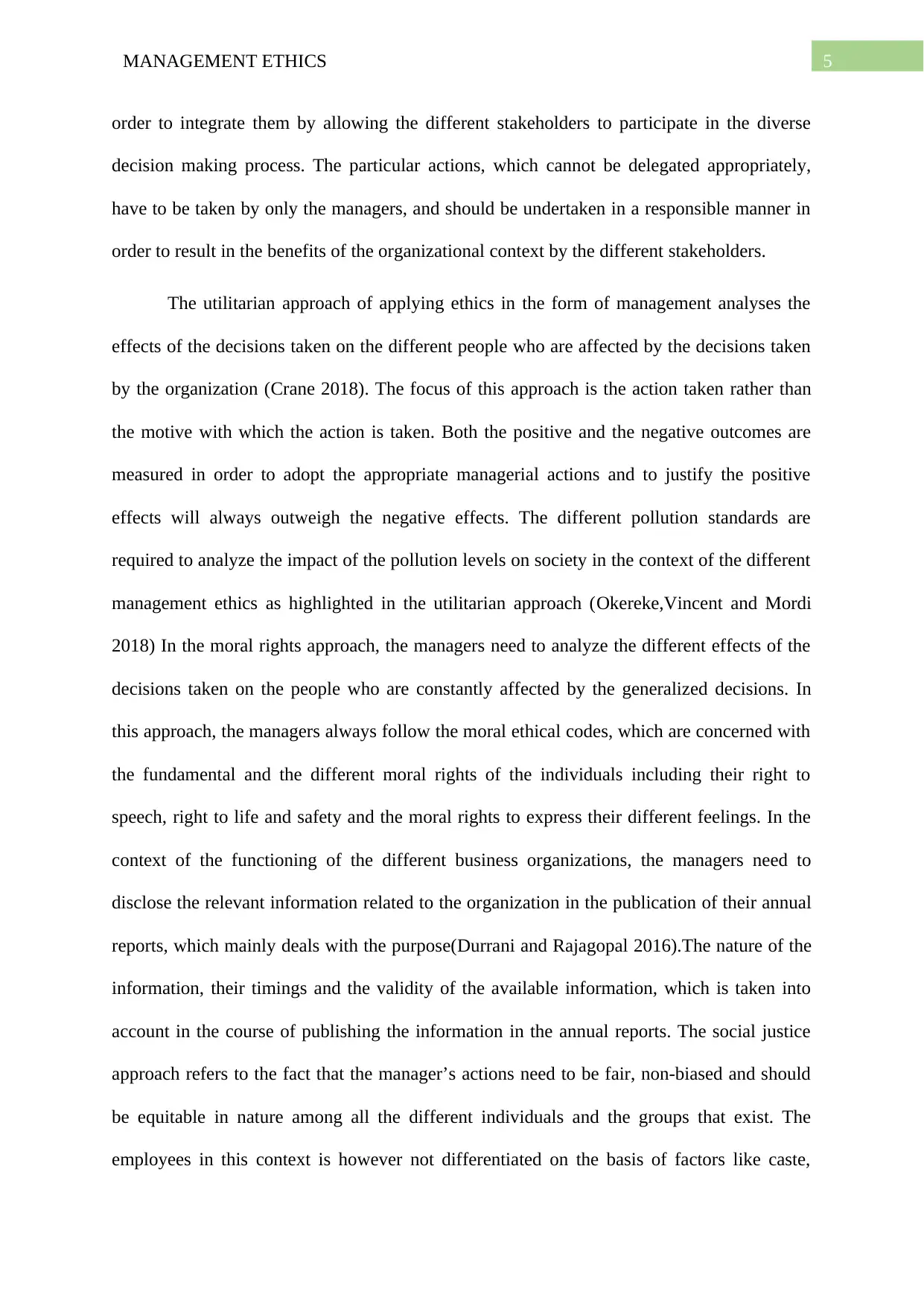
5MANAGEMENT ETHICS
order to integrate them by allowing the different stakeholders to participate in the diverse
decision making process. The particular actions, which cannot be delegated appropriately,
have to be taken by only the managers, and should be undertaken in a responsible manner in
order to result in the benefits of the organizational context by the different stakeholders.
The utilitarian approach of applying ethics in the form of management analyses the
effects of the decisions taken on the different people who are affected by the decisions taken
by the organization (Crane 2018). The focus of this approach is the action taken rather than
the motive with which the action is taken. Both the positive and the negative outcomes are
measured in order to adopt the appropriate managerial actions and to justify the positive
effects will always outweigh the negative effects. The different pollution standards are
required to analyze the impact of the pollution levels on society in the context of the different
management ethics as highlighted in the utilitarian approach (Okereke,Vincent and Mordi
2018) In the moral rights approach, the managers need to analyze the different effects of the
decisions taken on the people who are constantly affected by the generalized decisions. In
this approach, the managers always follow the moral ethical codes, which are concerned with
the fundamental and the different moral rights of the individuals including their right to
speech, right to life and safety and the moral rights to express their different feelings. In the
context of the functioning of the different business organizations, the managers need to
disclose the relevant information related to the organization in the publication of their annual
reports, which mainly deals with the purpose(Durrani and Rajagopal 2016).The nature of the
information, their timings and the validity of the available information, which is taken into
account in the course of publishing the information in the annual reports. The social justice
approach refers to the fact that the manager’s actions need to be fair, non-biased and should
be equitable in nature among all the different individuals and the groups that exist. The
employees in this context is however not differentiated on the basis of factors like caste,
order to integrate them by allowing the different stakeholders to participate in the diverse
decision making process. The particular actions, which cannot be delegated appropriately,
have to be taken by only the managers, and should be undertaken in a responsible manner in
order to result in the benefits of the organizational context by the different stakeholders.
The utilitarian approach of applying ethics in the form of management analyses the
effects of the decisions taken on the different people who are affected by the decisions taken
by the organization (Crane 2018). The focus of this approach is the action taken rather than
the motive with which the action is taken. Both the positive and the negative outcomes are
measured in order to adopt the appropriate managerial actions and to justify the positive
effects will always outweigh the negative effects. The different pollution standards are
required to analyze the impact of the pollution levels on society in the context of the different
management ethics as highlighted in the utilitarian approach (Okereke,Vincent and Mordi
2018) In the moral rights approach, the managers need to analyze the different effects of the
decisions taken on the people who are constantly affected by the generalized decisions. In
this approach, the managers always follow the moral ethical codes, which are concerned with
the fundamental and the different moral rights of the individuals including their right to
speech, right to life and safety and the moral rights to express their different feelings. In the
context of the functioning of the different business organizations, the managers need to
disclose the relevant information related to the organization in the publication of their annual
reports, which mainly deals with the purpose(Durrani and Rajagopal 2016).The nature of the
information, their timings and the validity of the available information, which is taken into
account in the course of publishing the information in the annual reports. The social justice
approach refers to the fact that the manager’s actions need to be fair, non-biased and should
be equitable in nature among all the different individuals and the groups that exist. The
employees in this context is however not differentiated on the basis of factors like caste,
⊘ This is a preview!⊘
Do you want full access?
Subscribe today to unlock all pages.

Trusted by 1+ million students worldwide
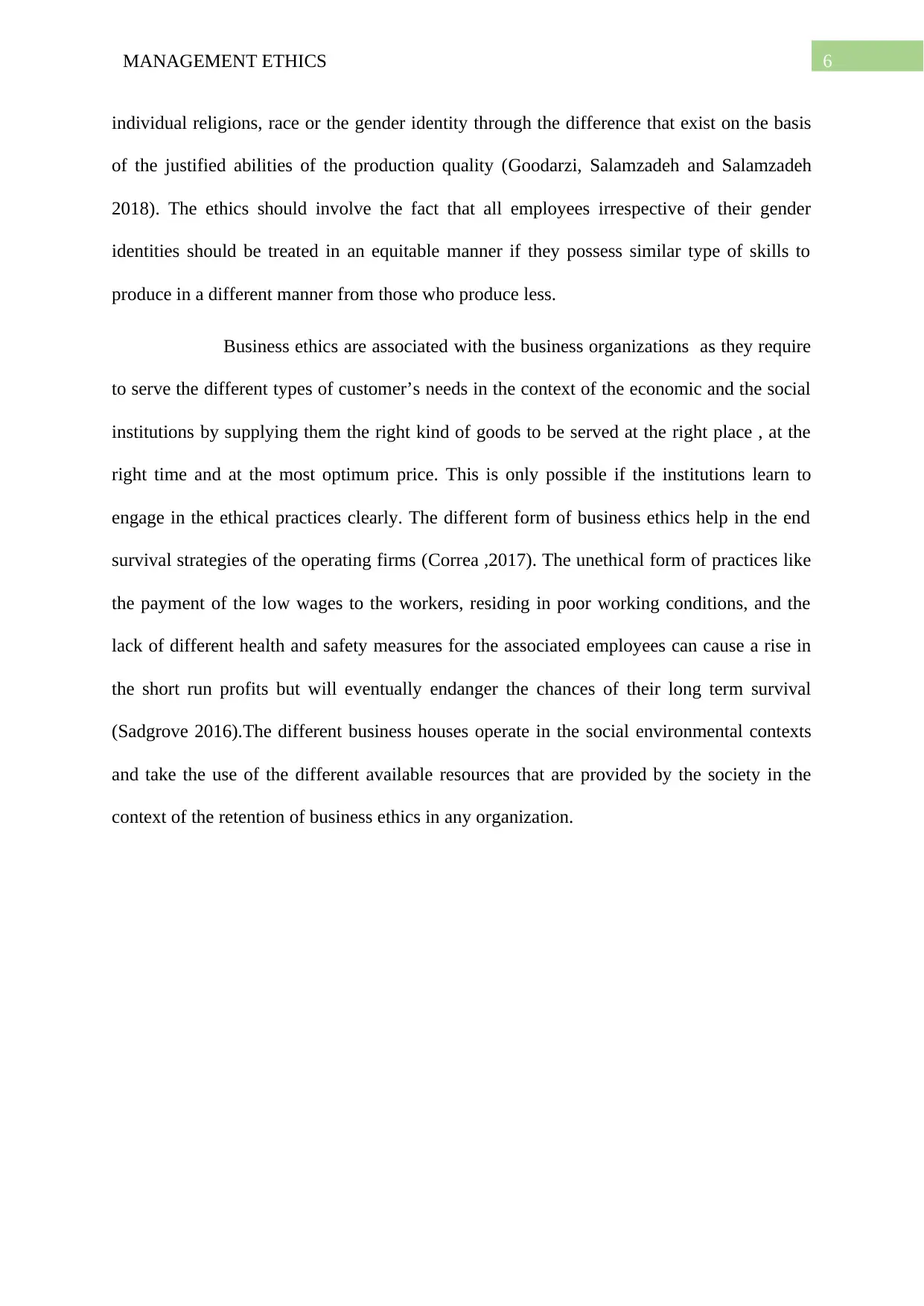
6MANAGEMENT ETHICS
individual religions, race or the gender identity through the difference that exist on the basis
of the justified abilities of the production quality (Goodarzi, Salamzadeh and Salamzadeh
2018). The ethics should involve the fact that all employees irrespective of their gender
identities should be treated in an equitable manner if they possess similar type of skills to
produce in a different manner from those who produce less.
Business ethics are associated with the business organizations as they require
to serve the different types of customer’s needs in the context of the economic and the social
institutions by supplying them the right kind of goods to be served at the right place , at the
right time and at the most optimum price. This is only possible if the institutions learn to
engage in the ethical practices clearly. The different form of business ethics help in the end
survival strategies of the operating firms (Correa ,2017). The unethical form of practices like
the payment of the low wages to the workers, residing in poor working conditions, and the
lack of different health and safety measures for the associated employees can cause a rise in
the short run profits but will eventually endanger the chances of their long term survival
(Sadgrove 2016).The different business houses operate in the social environmental contexts
and take the use of the different available resources that are provided by the society in the
context of the retention of business ethics in any organization.
individual religions, race or the gender identity through the difference that exist on the basis
of the justified abilities of the production quality (Goodarzi, Salamzadeh and Salamzadeh
2018). The ethics should involve the fact that all employees irrespective of their gender
identities should be treated in an equitable manner if they possess similar type of skills to
produce in a different manner from those who produce less.
Business ethics are associated with the business organizations as they require
to serve the different types of customer’s needs in the context of the economic and the social
institutions by supplying them the right kind of goods to be served at the right place , at the
right time and at the most optimum price. This is only possible if the institutions learn to
engage in the ethical practices clearly. The different form of business ethics help in the end
survival strategies of the operating firms (Correa ,2017). The unethical form of practices like
the payment of the low wages to the workers, residing in poor working conditions, and the
lack of different health and safety measures for the associated employees can cause a rise in
the short run profits but will eventually endanger the chances of their long term survival
(Sadgrove 2016).The different business houses operate in the social environmental contexts
and take the use of the different available resources that are provided by the society in the
context of the retention of business ethics in any organization.
Paraphrase This Document
Need a fresh take? Get an instant paraphrase of this document with our AI Paraphraser
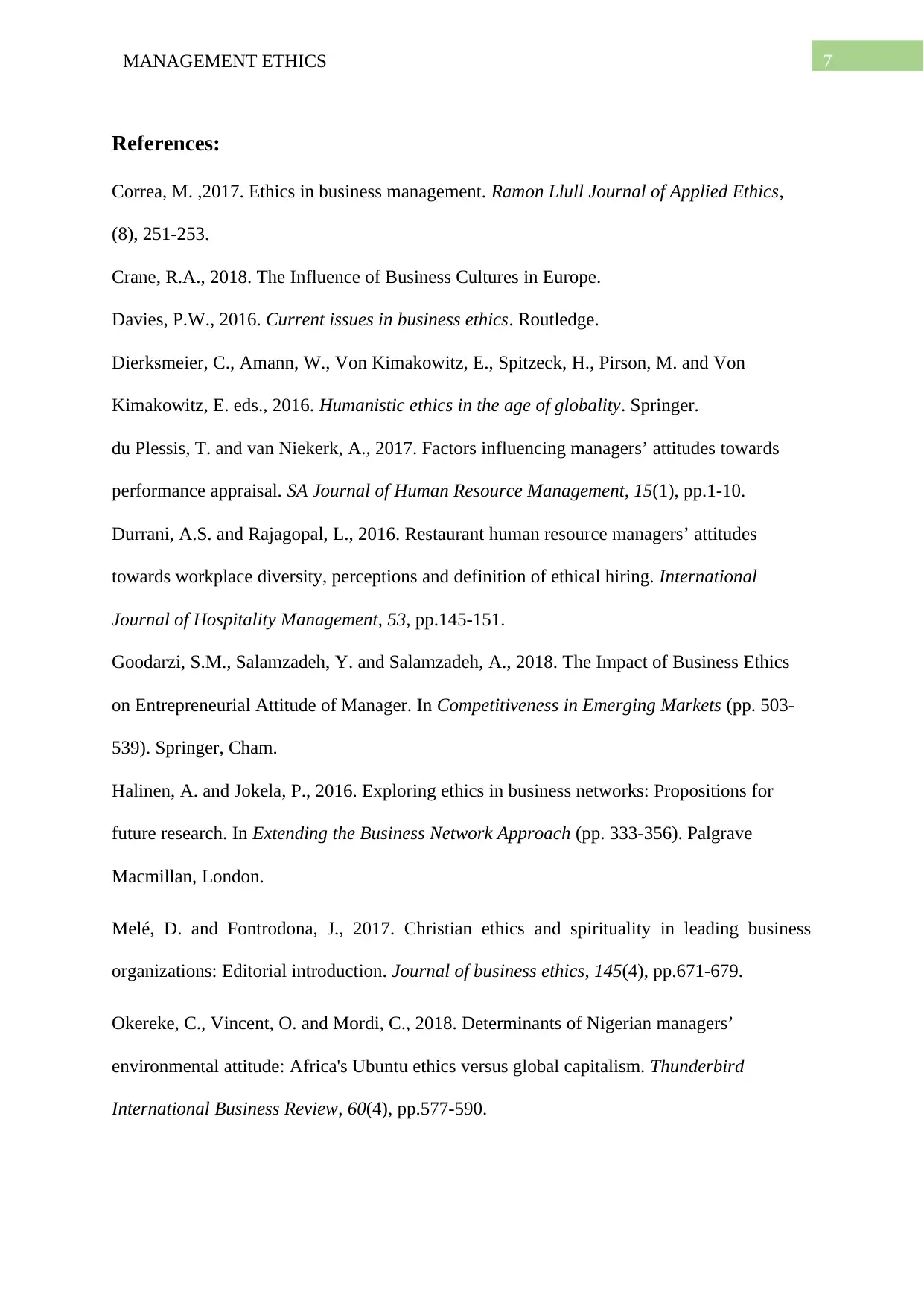
7MANAGEMENT ETHICS
References:
Correa, M. ,2017. Ethics in business management. Ramon Llull Journal of Applied Ethics,
(8), 251-253.
Crane, R.A., 2018. The Influence of Business Cultures in Europe.
Davies, P.W., 2016. Current issues in business ethics. Routledge.
Dierksmeier, C., Amann, W., Von Kimakowitz, E., Spitzeck, H., Pirson, M. and Von
Kimakowitz, E. eds., 2016. Humanistic ethics in the age of globality. Springer.
du Plessis, T. and van Niekerk, A., 2017. Factors influencing managers’ attitudes towards
performance appraisal. SA Journal of Human Resource Management, 15(1), pp.1-10.
Durrani, A.S. and Rajagopal, L., 2016. Restaurant human resource managers’ attitudes
towards workplace diversity, perceptions and definition of ethical hiring. International
Journal of Hospitality Management, 53, pp.145-151.
Goodarzi, S.M., Salamzadeh, Y. and Salamzadeh, A., 2018. The Impact of Business Ethics
on Entrepreneurial Attitude of Manager. In Competitiveness in Emerging Markets (pp. 503-
539). Springer, Cham.
Halinen, A. and Jokela, P., 2016. Exploring ethics in business networks: Propositions for
future research. In Extending the Business Network Approach (pp. 333-356). Palgrave
Macmillan, London.
Melé, D. and Fontrodona, J., 2017. Christian ethics and spirituality in leading business
organizations: Editorial introduction. Journal of business ethics, 145(4), pp.671-679.
Okereke, C., Vincent, O. and Mordi, C., 2018. Determinants of Nigerian managers’
environmental attitude: Africa's Ubuntu ethics versus global capitalism. Thunderbird
International Business Review, 60(4), pp.577-590.
References:
Correa, M. ,2017. Ethics in business management. Ramon Llull Journal of Applied Ethics,
(8), 251-253.
Crane, R.A., 2018. The Influence of Business Cultures in Europe.
Davies, P.W., 2016. Current issues in business ethics. Routledge.
Dierksmeier, C., Amann, W., Von Kimakowitz, E., Spitzeck, H., Pirson, M. and Von
Kimakowitz, E. eds., 2016. Humanistic ethics in the age of globality. Springer.
du Plessis, T. and van Niekerk, A., 2017. Factors influencing managers’ attitudes towards
performance appraisal. SA Journal of Human Resource Management, 15(1), pp.1-10.
Durrani, A.S. and Rajagopal, L., 2016. Restaurant human resource managers’ attitudes
towards workplace diversity, perceptions and definition of ethical hiring. International
Journal of Hospitality Management, 53, pp.145-151.
Goodarzi, S.M., Salamzadeh, Y. and Salamzadeh, A., 2018. The Impact of Business Ethics
on Entrepreneurial Attitude of Manager. In Competitiveness in Emerging Markets (pp. 503-
539). Springer, Cham.
Halinen, A. and Jokela, P., 2016. Exploring ethics in business networks: Propositions for
future research. In Extending the Business Network Approach (pp. 333-356). Palgrave
Macmillan, London.
Melé, D. and Fontrodona, J., 2017. Christian ethics and spirituality in leading business
organizations: Editorial introduction. Journal of business ethics, 145(4), pp.671-679.
Okereke, C., Vincent, O. and Mordi, C., 2018. Determinants of Nigerian managers’
environmental attitude: Africa's Ubuntu ethics versus global capitalism. Thunderbird
International Business Review, 60(4), pp.577-590.
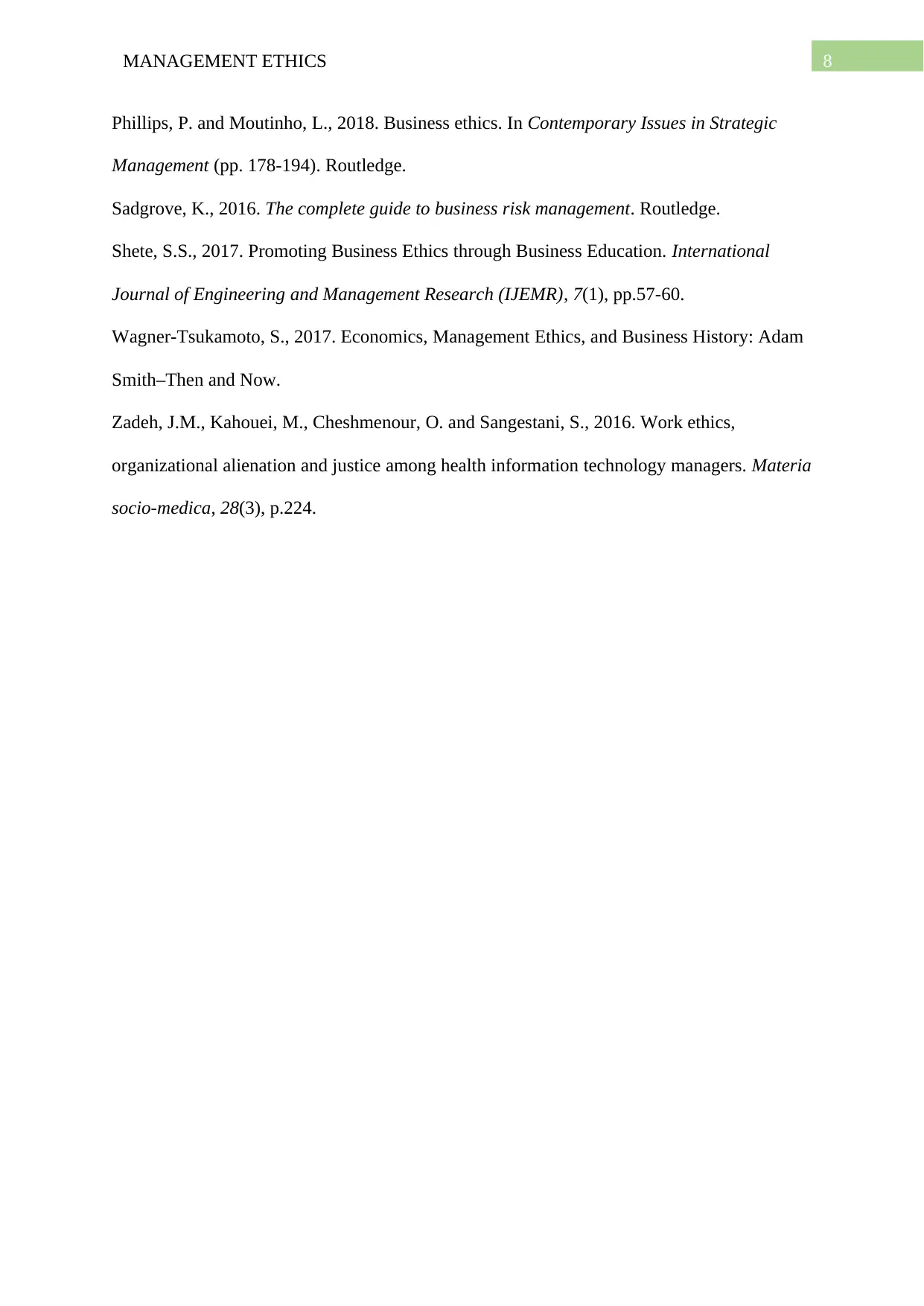
8MANAGEMENT ETHICS
Phillips, P. and Moutinho, L., 2018. Business ethics. In Contemporary Issues in Strategic
Management (pp. 178-194). Routledge.
Sadgrove, K., 2016. The complete guide to business risk management. Routledge.
Shete, S.S., 2017. Promoting Business Ethics through Business Education. International
Journal of Engineering and Management Research (IJEMR), 7(1), pp.57-60.
Wagner-Tsukamoto, S., 2017. Economics, Management Ethics, and Business History: Adam
Smith–Then and Now.
Zadeh, J.M., Kahouei, M., Cheshmenour, O. and Sangestani, S., 2016. Work ethics,
organizational alienation and justice among health information technology managers. Materia
socio-medica, 28(3), p.224.
Phillips, P. and Moutinho, L., 2018. Business ethics. In Contemporary Issues in Strategic
Management (pp. 178-194). Routledge.
Sadgrove, K., 2016. The complete guide to business risk management. Routledge.
Shete, S.S., 2017. Promoting Business Ethics through Business Education. International
Journal of Engineering and Management Research (IJEMR), 7(1), pp.57-60.
Wagner-Tsukamoto, S., 2017. Economics, Management Ethics, and Business History: Adam
Smith–Then and Now.
Zadeh, J.M., Kahouei, M., Cheshmenour, O. and Sangestani, S., 2016. Work ethics,
organizational alienation and justice among health information technology managers. Materia
socio-medica, 28(3), p.224.
⊘ This is a preview!⊘
Do you want full access?
Subscribe today to unlock all pages.

Trusted by 1+ million students worldwide
1 out of 9
Related Documents
Your All-in-One AI-Powered Toolkit for Academic Success.
+13062052269
info@desklib.com
Available 24*7 on WhatsApp / Email
![[object Object]](/_next/static/media/star-bottom.7253800d.svg)
Unlock your academic potential
Copyright © 2020–2026 A2Z Services. All Rights Reserved. Developed and managed by ZUCOL.





